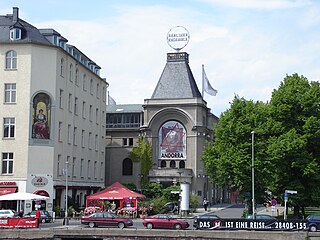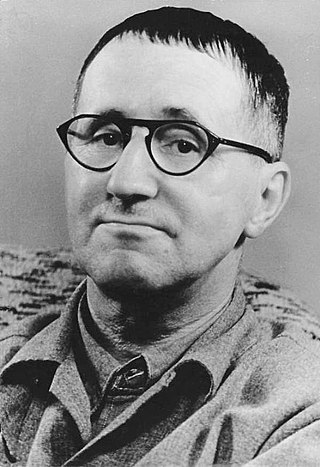Related Research Articles

Life of Galileo, also known as Galileo, is a play by the 20th century German dramatist Bertolt Brecht and collaborator Margarete Steffin with incidental music by Hanns Eisler. The play was written in 1938 and received its first theatrical production at the Zurich Schauspielhaus, opening on the 9th of September 1943. This production was directed by Leonard Steckel, with set-design by Teo Otto. The cast included Steckel himself, Karl Paryla and Wolfgang Langhoff.

Mother Courage and Her Children is a play written in 1939 by the German dramatist and poet Bertolt Brecht (1898–1956), with significant contributions from Margarete Steffin. Four theatrical productions were produced in Switzerland and Germany from 1941 to 1952, the last three supervised and/or directed by Brecht, who had returned to East Germany from the United States.

The Berliner Ensemble is a German theatre company established by actress Helene Weigel and her husband, playwright Bertolt Brecht, in January 1949 in East Berlin. In the time after Brecht's exile, the company first worked at Wolfgang Langhoff's Deutsches Theater and in 1954 moved to the Theater am Schiffbauerdamm, built in 1892, that was open for the 1928 premiere of The Threepenny Opera.
Saint Joan of the Stockyards is a play written by the German modernist playwright Bertolt Brecht between 1929 and 1931, after the success of his musical The Threepenny Opera and during the period of his radical experimental work with the Lehrstücke. It is based on the musical that he co-authored with Elisabeth Hauptmann, Happy End (1929). In this version of the story of Joan of Arc, Brecht transforms her into "Joan Dark", a member of the "Black Straw Hats" in 20th-century Chicago. The play charts Joan's battle with Pierpont Mauler, the unctuous owner of a meat-packing plant. Like her namesake, Joan is a doomed woman, a martyr and an innocent in a world of strike-breakers, fat cats, and penniless workers. Like many of Brecht's plays it is laced with humor and songs as part of its epic dramaturgical structure and deals with the theme of emancipation from material suffering and exploitation.

The Theater am Schiffbauerdamm is a theatre building at the Schiffbauerdamm riverside in the Mitte district of Berlin, Germany, opened on 19 November 1892. Since 1954, it has been home to the Berliner Ensemble theatre company, founded in 1949 by Helene Weigel and Bertolt Brecht.
Mr Puntila and His Man Matti is an epic comedy by the German modernist playwright Bertolt Brecht. It was written in 1940 and first performed in 1948.
The Decision, frequently translated as The Measures Taken, is a Lehrstück and agitprop cantata by the twentieth-century German dramatist Bertolt Brecht. Created in collaboration with composer Hanns Eisler and director Slatan Dudow, it consists of eight sections in prose and unrhymed, free verse, with six major songs. A note to the text by all three collaborators describes it as an "attempt to use a didactic piece to make familiar an attitude of positive intervention."
Señora Carrar's Rifles is a one-act play by the twentieth-century German dramatist Bertolt Brecht, written in collaboration with Margarete Steffin. It is a modern version of the Irish dramatist John Millington Synge's play Riders to the Sea (1904). The play's setting is re-located to Spain during the height of the Civil War. Teresa Carrar, the mother, wants to protect her children but ends up fighting on the side of the oppressed. Brecht wrote it in 1937 and it received its first theatrical production in the same year, opening in Paris on 16 October. This production was directed by Slatan Dudow and Helene Weigel played Señora Carrar.
Round Heads and Pointed Heads is an epic parable play written by the German dramatist Bertolt Brecht, in collaboration with Margarete Steffin, Emil Burri, Elisabeth Hauptmann, and the composer Hanns Eisler. The play's subtitle is Money Calls to Money and its authors describe it as "a tale of horror." The play is a satirical anti-Nazi parable about a fictitious country called Yahoo in which the rulers maintain their control by setting the people with round heads against those with pointed heads, thereby substituting racial relations for their antagonistic class relations. The play is composed of 11 scenes in prose and blank verse and 13 songs. Unlike another of Brecht's plays from this period, The Mother, Round Heads and Pointed Heads was addressed to a wide audience, Brecht suggested, and took account of "purely entertainment considerations." Brecht's notes on the play, written in 1936, contain the earliest theoretical application of his "defamiliarization" principle to his own "non-Aristotelian" drama.

Mahagonny, ein Songspiel, or Mahagonny, a song-play, was written by composer Kurt Weill and dramatist Bertolt Brecht and first performed with that title and description in 1927. Elisabeth Hauptmann contributed the words to two of its songs. Just under half an hour in length, the work can be thought of as a staged or scenic cantata. By the end of 1929, however, Mahagonny had grown into a two-hour opera with the title Aufstieg und Fall der Stadt Mahagonny, or Rise and Fall of the City of Mahagonny. This was premiered in March 1930. Today the cantata and the opera are considered separately, the latter holding a place in the repertory, the former being an occasional piece staged in small theaters or programmed as an outgrowth of a song recital when resources permit. For this reason the shorter work is informally referred to as Das kleine Mahagonny, or The Little Mahagonny, or as Mahagonny-Songspiel.
Don Juan is an adaptation by the twentieth-century German dramatist Bertolt Brecht of the 17th century French play Dom Juan by Molière. It was the first performance of the Berliner Ensemble after its move to Theater am Schiffbauerdamm, in 1954.
Caspar Neher was an Austrian-German scenographer and librettist, known principally for his career-long working relationship with Bertolt Brecht.

Margarete Emilie Charlotte Steffin was a German actress and writer, one of Bertold Brecht's closest collaborators, as well as a prolific translator from Russian and Scandinavian languages.

Eugen Berthold Friedrich Brecht, known as Bertolt Brecht and Bert Brecht, was a German theatre practitioner, playwright, and poet. Coming of age during the Weimar Republic, he had his first successes as a playwright in Munich and moved to Berlin in 1924, where he wrote The Threepenny Opera with Elisabeth Hauptmann and Kurt Weill and began a life-long collaboration with the composer Hanns Eisler. Immersed in Marxist thought during this period, Brecht wrote didactic Lehrstücke and became a leading theoretician of epic theatre and the Verfremdungseffekt.

Sonja Kehler was a German actress and chanson singer, known internationally for her interpretation of works by Bertolt Brecht, first playing his characters on the theatre stage, then focused on singing his songs and those of others in solo programs. She also taught acting in Danish at the theatre academy in Odense, appeared in films, worked as stage director and presented literary programs.

The "Einheitsfrontlied", translated as the "United Front Song" in English, is one of the most famous songs of the German labour movement. It was written by Bertolt Brecht and composed by Hanns Eisler. The best-known rendition was sung by Ernst Busch.

Peter Palitzsch was a German theatre director. He worked with Bertolt Brecht in his Berliner Ensemble from the beginning in 1949, and was in demand internationally as a representative of Brecht's ideas. He was a theatre manager at the Staatstheater Stuttgart and the Schauspiel Frankfurt. Many of his productions were invited to the Berliner Theatertreffen festival. He worked internationally from 1980.
![<i>Mutter Courage und ihre Kinder</i> (film) 1961 [[German Democratic Republic]] film](https://upload.wikimedia.org/wikipedia/commons/thumb/6/6b/Bundesarchiv_Bild_183-80357-0001%2C_Berlin%2C_Kino_%22OTL%22%2C_Nacht.jpg/320px-Bundesarchiv_Bild_183-80357-0001%2C_Berlin%2C_Kino_%22OTL%22%2C_Nacht.jpg)
Mutter Courage und ihre Kinder 1961 East German film produced by DEFA documenting the Berliner Ensemble staging of Bertolt Brecht's play of the same name. The play ran from 1959 to 1961, with Manfred Wekwerth and Peter Palitzsch directing, and stars Helene Weigel in the title role; it was modelled after the original 1949 production by Brecht and Erich Engel. The film received a prize at the Locarno Film Festival.
Brecht is a 2019 TV docudrama film, dealing with the life and work of the German playwright Bertolt Brecht. A co-production between Bavaria Fiction in Germany, Satel Film in Austria and MIA Film in the Czech Republic, principal photography occurred in and around Prague from 30 May to 28 July 2017. Formed of two 90-minute parts, it was scripted and directed by Heinrich Breloer, with Tom Schilling and Burghart Klaußner in the title role. It premiered at the Berlinale 2019.

As part of an anti-communist campaign in Austria against the author Bertolt Brecht, his work was boycotted for ten years. Between 1953 and 1963, no established Viennese theater performed his works. The initiators were the publicists Hans Weigel and Friedrich Torberg as well as the Burgtheater director Ernst Haeussermann.
References
- 1 2 Willett (1959, 40–41).
- ↑ Bernstein, Lee (2010). "The Age of Jackson: George Jackson and the Radical Critique of Incarceration". America is the Prison: Arts and Politics in Prison in the 1970s. Chapel Hill, North Carolina: University of North Carolina Press. p. 52. ISBN 9780807871171 . Retrieved July 12, 2011.